Our Product Delivery team has been hard at work the past quarter shipping incredibly powerful new functionality including the ability to require approvals for critical environments, integrate with ServiceNow to request approvals for flag changes, correlate anonymous users during experiments, and much more. Let’s take a look at some of the key highlights.
Require approvals before making changes to critical feature flags with Approval Workflows
Earlier this year we launched Flag Approvals, which allows users to request a review from teammates for a set of proposed flag changes from within LaunchDarkly. Through a simple process for requesting approval, you can loop in the right people to provide input into your proposed flag changes before they get applied.
With Approval Workflows, we’ve taken things one step further, allowing you to require approvals for all or some flags in critical environments, like Production, and schedule the approved changes for a future time.
This powerful new functionality, only available with our Enterprise plans, helps development teams maintain compliance with their existing change management processes while still empowering developers to do their best work.
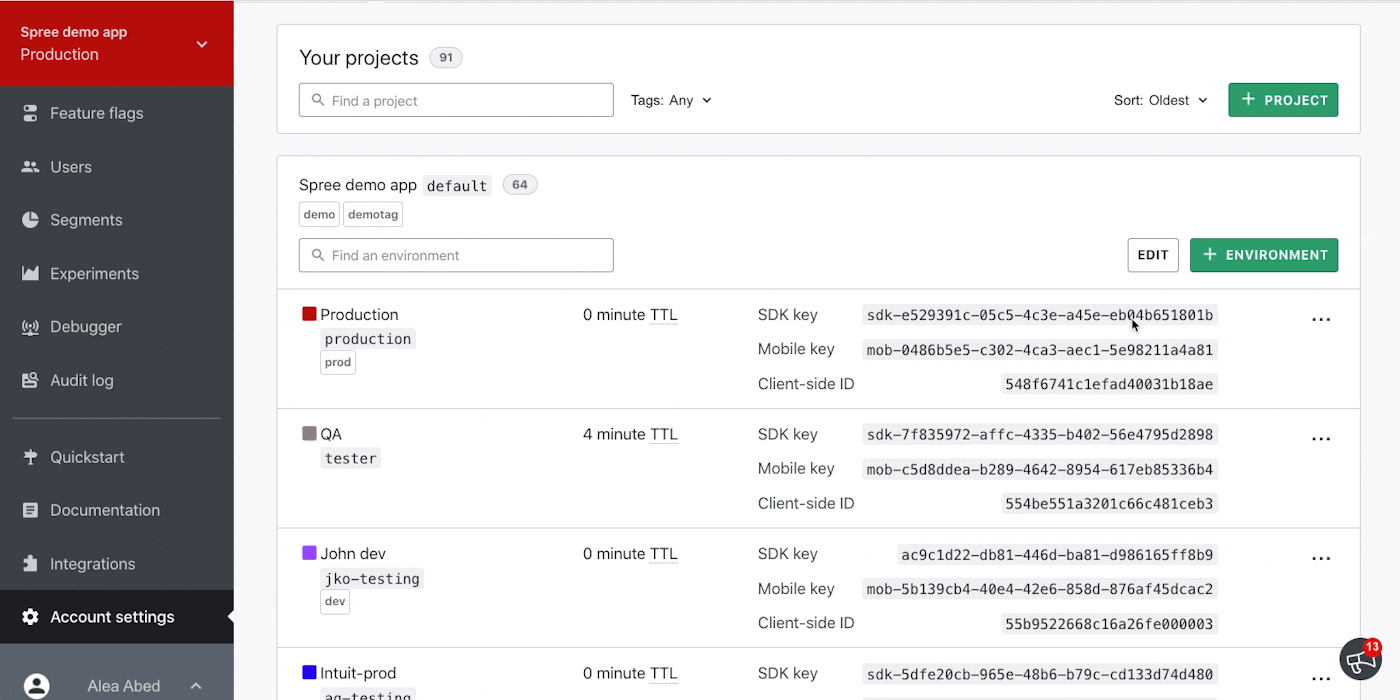
The updated approval settings give teams the option to enforce approval requirements across every feature flag in the environment or filter down to a specific set of flags using tags. You can also set a minimum number of approvals required—up to five—in case your process requires multiple teammates to approve changes before they can be applied.
Approval Workflows gives your team the necessary safeguards to quickly ship new features while maintaining compliance with your change management requirements. Developers can request new features be turned on when they’re ready, and managers gain confidence knowing every change has been vetted by the proper teams.
Learn more about Approval Workflows.
Integrate flag updates with your existing change management processes in ServiceNow
For teams that have invested in using ServiceNow for centralized change management, we now also support Approval Workflows via ServiceNow.
With this integration, flag changes made in LaunchDarkly will automatically create requests in ServiceNow.
LaunchDarkly will monitor the status of the change request in ServiceNow and, once it’s approved, the proposed feature flag changes can be applied in our platform with ease.
This powerful new integration will keep your releases running smoothly and automatically log all your change requests in ServiceNow for audit purposes.
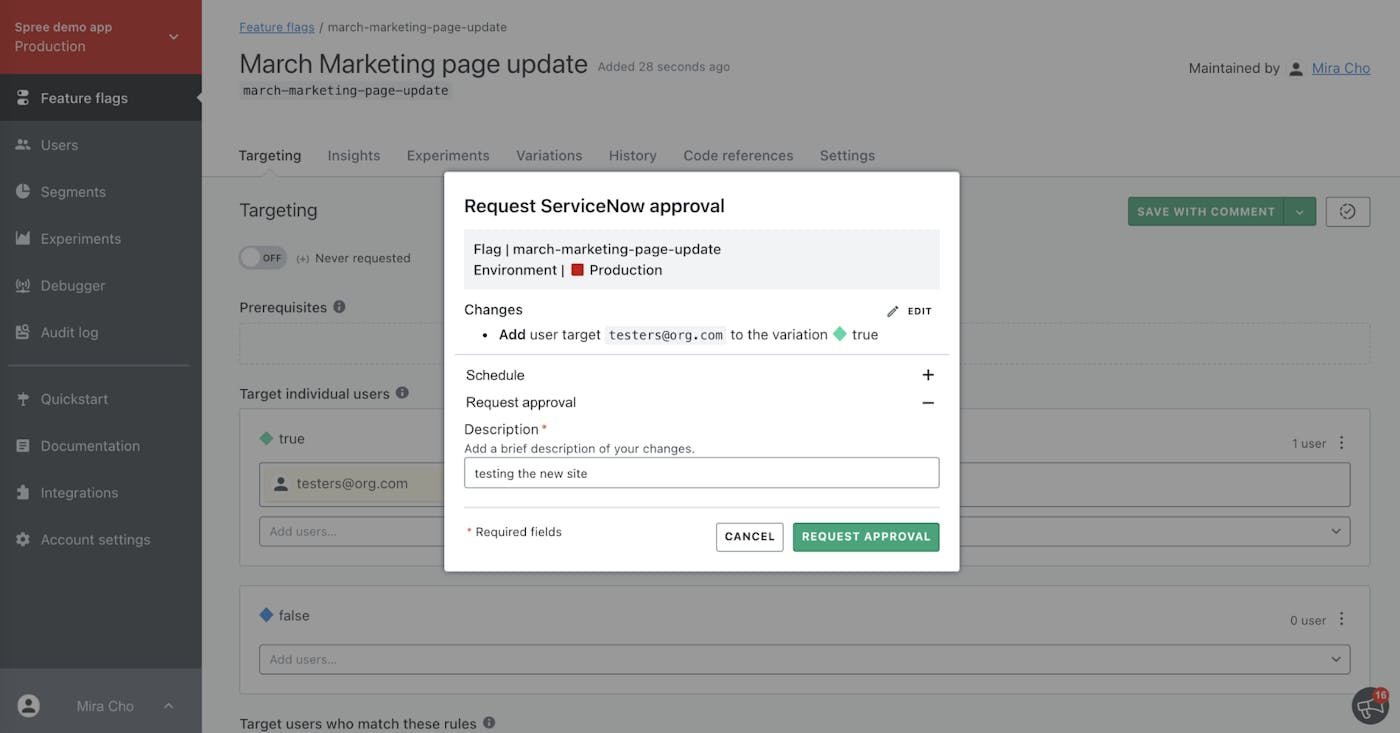
Learn more about the ServiceNow approvals integration.
Flag Delivery @Edge improves initialization times 10x by moving flag evaluations to the edge layer
At LaunchDarkly, our streaming architecture is the lifeblood for every product feature we build. It’s why we’re able to serve over 20 trillion feature flags per day and have 15M+ client devices connected at any given time.
However, for our platform delivery team, that’s not enough. They are constantly pushing us to deliver our services faster while ensuring we maintain reliability at any scale. We’re happy to announce that with the launch of our Flag Delivery @Edge project, we’re now able to reduce SDK initialization times to under 25ms.
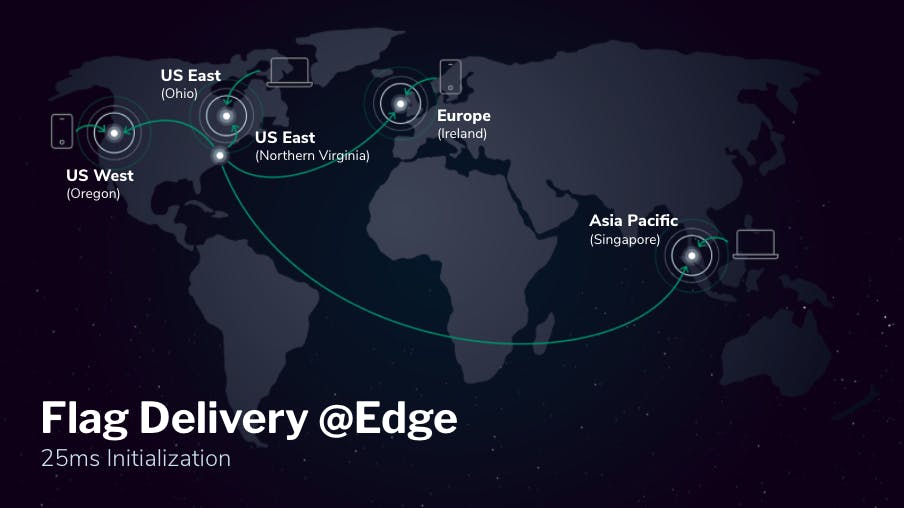
With Flag Delivery @Edge, we’ve moved the expensive step—flag evaluation—to the edge layer. Now, the heavy lifting is done at points of presence around the globe, yielding massive performance gains.
We’ve clocked mean initialization times at 25ms, down from 250ms or more, which is about a 10x improvement for client-side initialization. And, it’s available right now to everyone, with no changes needed.
Now, client-side flags just work, with no performance penalty or content flash.
New SDK support for Erlang and Apex Salesforce
Our SDK team is always hard at work making sure every major program language is supported in LaunchDarkly.
And we’ve now added two new server-side SDKs: Erlang and Apex Salesforce.
With these two SDKs, you’ll be able to use feature flags within multi-server applications built in Erlang and your Salesforce applications.
Correlate anonymous users with alias events
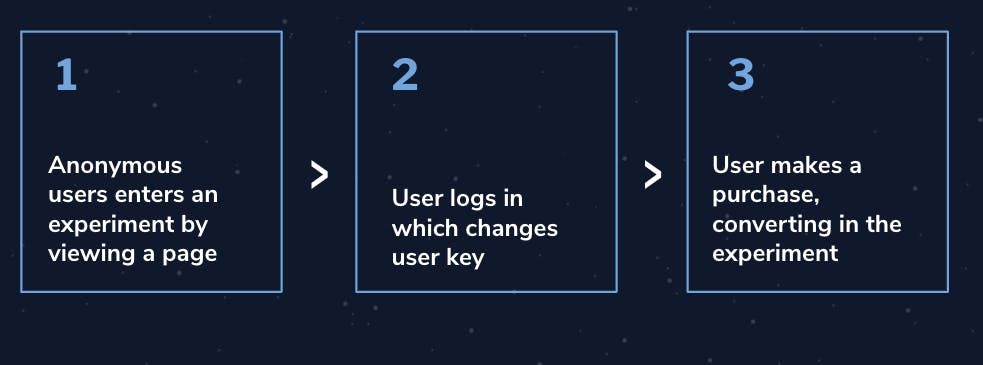
Gathering accurate data and running experiments can be tricky when a user starts as anonymous and later decides to log into your application. Oftentimes, this ends up counting as two separate users in your data set and completely throws off conversion metrics.
To solve this problem, we have created an alias event which makes it possible to correlate users who entered an experiment with one user key and converted with a different one.
This new alias event is available for experiments run within LaunchDarkly, as well as the ability to use Data Export to ingest alias events into your data warehouse.
Learn more about aliasing users.
Convert any targeting rule into a segment
Many of our customers use complex flag targeting rules. These can be in the form of large user lists, rules involving multiple user attributes, and multiple rules for a single flag.
Previously, reusing these rules across flags could be challenging as it required you to manually rebuild targeting rules from scratch each time you wanted to reuse them.
To solve for this, we added a “Convert to segment” option. Selecting “Convert to segment” gives you the ability to add a segment name, and optionally a description and tag.
Saving the segment replaces the targeting rule on your flag with the newly-created segment and makes it available for reuse on other flags in your code. This new feature simplifies and speeds up reusing targeting rules, giving your team better control over flag targeting, and in turn, your user's experiences.
Learn more about converting a rule into a segment.
Find and manage users faster with these new user page improvements
The Users page is an important place for many LaunchDarkly customers. We see thousands of visits to this page each month, and have numerous customer requests to improve this destination spot to make jobs easier.
To that end, we’ve recently added a few new updates that should help make finding and managing users a lot smoother.
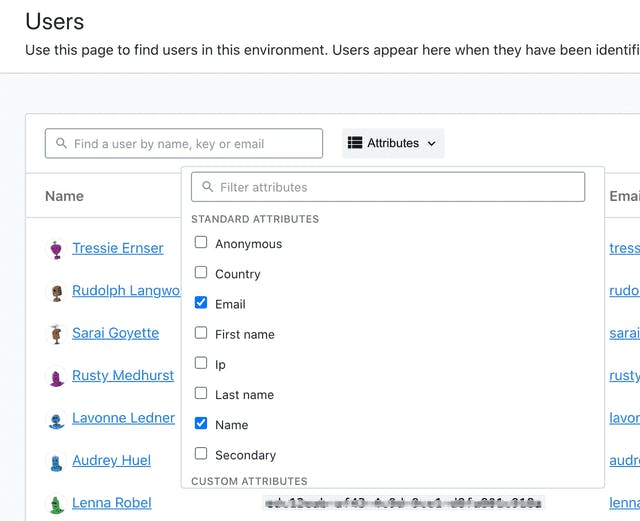
First, we added a user attributes dropdown which allows you to view and filter based on any attribute, including custom ones added to LaunchDarkly.
This new view will also persist in your LaunchDarkly user account so you won't have to continually re-apply the filters every time you visit the Users page.
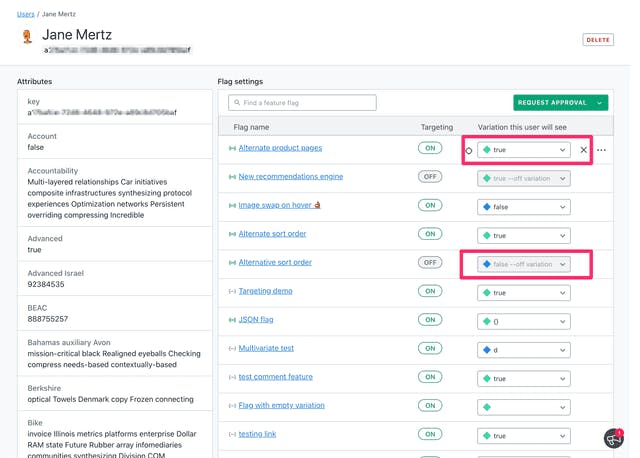
We’ve also made improvements to the individual Users page, adding insights into the state of the world for that user.
Now, at a glance, you can quickly see which features are active for a particular user including the flag status, targeting, and the variation this user will see, along with the option to change a user's variation directly from the page.
Learn more about customizing the Users dashboard.
View feature flag dependencies within the targeting and variations tabs
Many customers build feature dependencies into their release planning with flag prerequisites. In fact, at LaunchDarkly, our Product Delivery team does this often. For instance, our teams may set up a feature or service to only be available if another feature flag is also available.
Feature dependencies are a powerful tool for constructing the perfect release plan, but they also introduce a second layer of complexity when making flag changes. Making changes to one flag might affect another, which introduces a potential risk if users don’t have the right context.
Now, when customers view a feature flag with downstream dependencies, LaunchDarkly will surface notices to help them make informed decisions about potential downstream changes to flag targeting. This appears in two locations: the Targeting and Variations tabs on feature flags.
Flag targeting info:
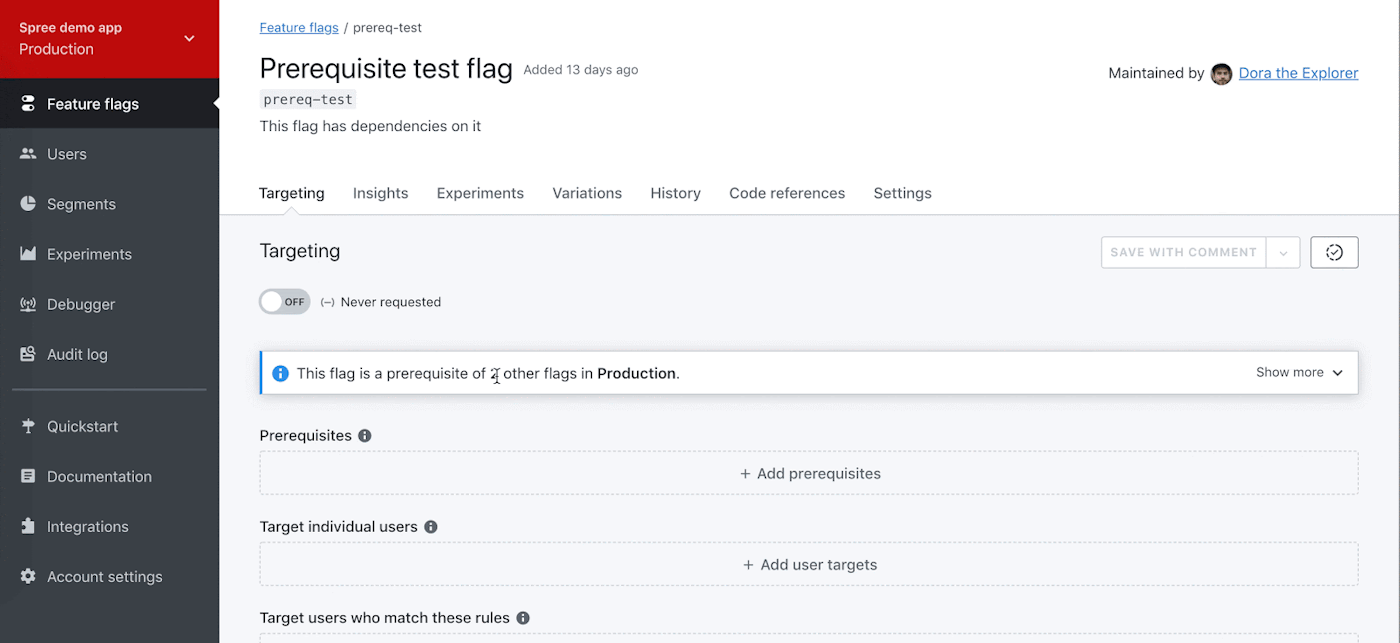
Flag variations warning:
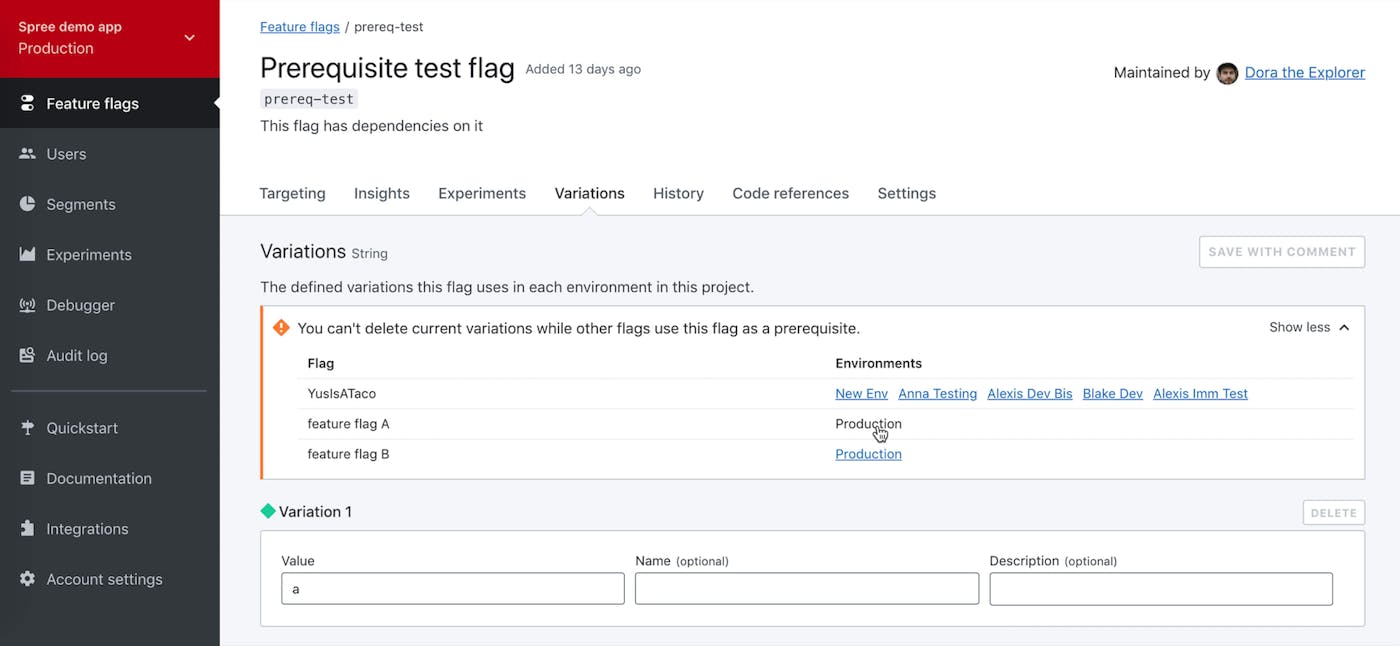
This gives your team helpful reminders about dependent flags when viewing a flag’s Targeting and Variations tabs. Plus, all the flag names will be listed and linked for easy access.
Learn more about flag prerequisites.
What’s on deck
It’s been an exciting couple of months delivering new features for our customers.
We have some awesome new functionality on the way that we can't wait to share, including support for really large user segments (1M+ users stored in your CDP platforms like Amplitude), new integrations with Salesforce and Zendesk, team administration improvements, and the much-awaited launch of workflow templates.
There are lots of great new features on the horizon, so stay tuned for more product updates.
Want to be first to try our latest features?
Join our Early Access Program to unlock access to our newest features. Sign up here.





